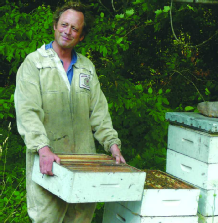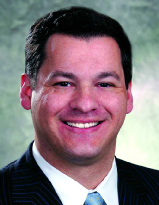Todd Hardie '76 & Jared Genser '95
Honey Business
Todd Hardie '76
 When Todd Hardie gets a bee sting, he doesn't mind the pain—he's thankful for the health benefits. Hardie is the owner of Honey Gardens, Inc., which specializes in products made from raw honey and other bee-derived ingredients. He is a proponent of apitherapy, the medicinal application of substances like honey, beeswax, propolis (a resin bees produce from plant material), and even venom.
When Todd Hardie gets a bee sting, he doesn't mind the pain—he's thankful for the health benefits. Hardie is the owner of Honey Gardens, Inc., which specializes in products made from raw honey and other bee-derived ingredients. He is a proponent of apitherapy, the medicinal application of substances like honey, beeswax, propolis (a resin bees produce from plant material), and even venom.
When Hardie was twelve, he and his brother began keeping a beehive and were fascinated by how much the honey-making, pollinating insects benefited humans. "Bees do very important work," he says, "and I wanted to be part of it." After studying entomology and agricultural sciences at Cornell, Hardie worked for commercial beekeepers around the Finger Lakes and as a state apiary inspector. In the late Seventies he began his own commercial beekeeping operation, which eventually grew to 1,900 beehives in New York and Vermont.
Hardie's business has since shifted away from beekeeping and toward the production and marketing of his products, which are sold in stores across the U.S. and can be purchased online at www.honeygardens.com. Beekeepers in Vermont's Champlain Valley provide the raw ingredients for Hardie's apitherapy products—which include elderberry syrup for colds and flu, propolis spray for cuts, and raw honey for digestive system support—as well as the honey wine he produces at his distillery, Caledonia Spirits. Hardie is currently researching the medicinal potential of bee venom, which he says aids the immune system. "If you're not allergic," he says, "bee venom is one of the healthiest things you can put into your body."
— Marc Campasano '11
Freedom Fighter
Jared Genser '95
 In 1999, British activist James Mawdsley was arrested in Burma after handing out democracy leaflets and sentenced to seventeen years in solitary confinement. On the other side of the globe, University of Michigan law student Jared Genser read about Mawdsley's case and spent the next year campaigning for his release. The U.N. ultimately ruled that Mawdsley's confinement violated international law, and he was released after 416 days in prison. "I was ten feet away when Mawdsley was reunited with his family," Genser remembers. "He gave me a firm handshake and said, 'You saved my life.'"
In 1999, British activist James Mawdsley was arrested in Burma after handing out democracy leaflets and sentenced to seventeen years in solitary confinement. On the other side of the globe, University of Michigan law student Jared Genser read about Mawdsley's case and spent the next year campaigning for his release. The U.N. ultimately ruled that Mawdsley's confinement violated international law, and he was released after 416 days in prison. "I was ten feet away when Mawdsley was reunited with his family," Genser remembers. "He gave me a firm handshake and said, 'You saved my life.'"
Ten years later, the story has become a familiar one for Genser. After Mawdsley's release, the two founded Freedom Now, a nonprofit that works to free prisoners of conscience. "We represent people who are imprisoned because of their exercise of the basic human rights that are guaranteed by international law," Genser says. The D.C.-based organization works with a network of pro bono attorneys to provide legal, political, and public relations advocacy. Its clients include Burmese activist and Nobel Peace Prize laureate Aung San Suu Kyi, who was held under house arrest for fifteen of the past twenty-one years.
In addition to serving as president of Freedom Now, Genser is a partner at the law firm DLA Piper. In 2010, his philanthropic work was recognized with the Charles Bronfman Prize, an award for young Jewish humanitarians that carries a $100,000 cash prize. But for him, the work is its own reward. Says Genser: "To stand in solidarity with people who are facing the most profound and severe forms of oppression, and to be able to feel like I have an impact on all that suffering, is a wonderful feeling."
— Adrienne Zable '11


